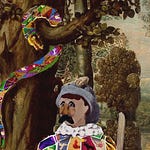XIX. PAPILLONS NOIRSDe sinistres papillons noirs Du soleil ont éteint la gloire, Et l’horizon semble un grimoire Barbouillé d’encre tous les soirs.
Il sort d’occultes encensoirs Un parfum troublant la mémoire : De sinistres papillons noirs Du soleil ont éteint la gloire.
Des monstres aux gluants suçoirs
Recherchent du sang pour le boire,
Et du ciel, en poussière noire,
Descendent sur nos désespoirs
De sinistres papillons noirs.
XIX. BLACK MOTHSSome sinister black moths have extinguished the sun’s glory, and the horizon resembles a book of spells bedaubed with black ink every evening.
There floats out of hidden censers a perfume bearing confusion to the memory: some sinister black moths have extinguished the sun’s glory.
Monsters with sticky suckers are searching for blood to drink, and from the sky, as a black dust, there descend onto our despairs some sinister black moths.
1 This is the fourth rondel in Rondels Morbides, where it has the same title.
PAPILLONS : The folk distinction that English makes (with little or no scientific justification) between moths and butterflies, disjoint groups which together cover all lepidopterans, has never been established in French: « papillon » refers indifferently to a member of either group.
3 gloire : See XIX.12.
4 grimoire : « Livre dont on dit que les magiciens se servent pour évoquer les démons, etc. », ‘Book which is said to be used by magicians to evoke demons, etc.’. The current edition of DAf adds an etymological note: « XIVe siècle, grymoire. Altération de gram-aire, ancienne forme de grammaire, pris au sens de ‹ livre de magie ›, parce qu’au Moyen Âge les grammaires, écrites en latin, étaient incompréhensibles au vulgaire », ‘15th century, grymoire. Variant of gramaire, ancient form of grammaire, ‘book of magic’, because in the Middle Ages grammar books, written in Latin, were incomprehensible to common people.”
5 barbouillé d’encre : In all editions of DAf through 1878, the first principal definiens for barbouiller is « Salir », ‘to soil’; through 1878, the second is « Peindre grossièrement de quelque couleur, avec une brosse », ‘To paint crudely in some color, using a brush’ (promoted to first in DAf1935). From 1718 through 1878, the default color of « encre », ‘ink’, is noire, ‘black’.
6 occultes : Hidden (either literally or figuratively, but almost always the latter). After a long list of example usages that ends « Maladie occulte. Sciences occultes. Philosophie occulte », DAf1878 notes that « occulte » « n’est guère usité que dans ces sortes de locu-tions », ‘is hardly used except in such locutions’.
encensoirs : ‘Censers’ or ‘thuribles’, i.e., devices to distribute the fumes of burning incense. More specifically (DAf1878), « Espèce de cassolette suspendue à de petites chaînes, dans laquelle on brûle de l’encens, et dont on se sert pour encenser », ‘A sort of pot suspended by small chains, in which incense is burned, and which is used to encenser’, where « encenser » means « Envoyer vers quelqu’un ou quelque chose de la fumée d’encens », ‘To render to someone or something the fumes of incense’. In Roman Catholic worship, a thuriféraire (E. ‘thurifer’) is a « Clerc qui, dans les céré-monies de l’église, a la fonction de porter l’encensoir », ‘Cleric who, in religious ceremonies, serves by carrying the thurible’ (and swinging it on its chains). Censers so carried (and swung) are of course the very opposite of hidden.
7 parfum : The article « parfum » in DAf1694–1798 begins « Agréable senteur qui s’exhale de quelque chose d’odoriférant », ‘Pleasant scent emitted by something odorous’; this changes, in DAF1835–1935, to « Odeur aromatique, agréable, plus ou moins forte, plus ou moins subtile et suave, qui s’exhale d’une substance quelconque, et particulièrement des fleurs », ‘Aromatic odor, pleasant, more or less subtle and soft, emitted from any substance, particularly flowers’. The OED’s article “perfume” says “Originally: a substance which emits a pleasant smell when burned; incense. Later usually: a fragrant liquid, usually consisting of aromatic ingredients (natural or synthetic) in a base of alcohol, used to impart a pleasant smell to the body, clothes, etc.” See XXV.2.
troublant : See XVIII.4.
12 poussière noire : ’Black dust’. Both the literal and figurative semantics of French « poussière » align remarkably closely with those of English ‘dust’ (e.g., every edition of DAf has included the idiom mordre la poussière, literally ‘bite the dust’, assigning it the identical figurative meaning to that English phrase; and similarly with allusive refer-ences to mortality, to dry scholarship, etc.). Belgian French is particularly blessed with phrasal idioms using the word: 7 of the 10 such documented in the Base de données lexicographiques panfrancophone are Belgian—they include cache-poussière (‘dustcoat’ in British English), loque à poussière (‘dust cloth’), and faire-poussières (‘to dust’, in the sense of housework). Giraud’s three uses of « poussière », at XLI.2, XLIX.4, and here, are all more or less literal (although each does specify a color for the dust: black, pink, and bluish, respectively) and in no way idiomatic. Given the high background level of dust-consciousness in his speech community, it seems unreasonable to draw any strong conclusions about any strictly poetic motivations for those uses—he may simply be painting a homely picture.









Share this post